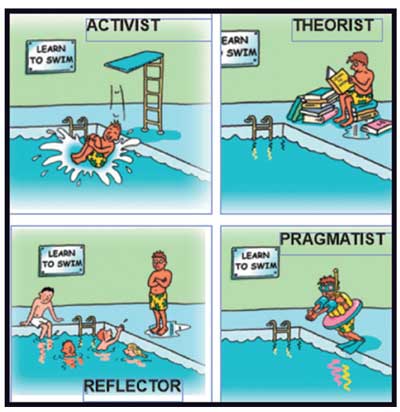29 May 2017 - {{hitsCtrl.values.hits}}

To be an effective leader in the 21st century you have to do a lot more than just deliver results (that much is expected). Effective leadership requires certain critical experiences to deliver clarity of thought, along with the ability to embrace differences and broaden observations to see beyond the obvious.
In this instalment, we will show you how to accelerate and increase learning from your experiences.
Achieving more by learning quickly
You can speed up learning from your experiences by adopting a more structured approach called the teaming cycle, a technique made famous by Peter Honey and Alan Mumford.
They identified four distinct styles or preferences that people use while learning. They suggest that most of us tend to follow only one or two of these styles and different learning activities may be better suited to particular styles. Knowing your predominant learning style will help you judge how likely an activity is to be helpful to you.

Activists
Activists are people who learn by doing. They like to involve themselves in new experiences and will ‘try anything once’. They tend to act first and consider the consequences afterwards.
Activists learn best when: (1) involved in new experiences, problems and opportunities, (2) thrown in at the deep end, (3) working with others in problem-solving, games, role-playing exercises, (4) able to lead a group.
Activists learn least when: (1) listening to lectures or reading long explanations, (2) reading, writing and thinking on their own, (3) analysing and interpreting lots of data, (4) following precise instructions.
Reflectors
Reflectors learn by observing and thinking about what happened. They like to consider all the possible angles and implications before coming to a considered opinion. They spend time listening and observing and tend to be cautious and thoughtful.
Reflectors learn best when: (1) able to stand back and observe first, (2) given time to think and investigate before commenting or acting, (3) given an opportunity to review what has happened, (4) doing tasks without tight deadlines.
Reflectors learn least when: (1) forced to take a lead in a group, (2) doing things without preparation, (3) rushed by deadlines.
Theorists
Theorists like to understand the theory behind the actions. They need models, concepts and facts in order to learn. They like to analyse and synthesise and feel uncomfortable with subjective judgements.
Theorists learn best when: (1) an activity is backed up by ideas and concepts that form a model, system or theory, (2) in a structured situation with a clear purpose, (3) they have the chance to question and probe, (4) required to understand a complex situation.
Theorists learn least: (1) in situations that emphasise emotions and feelings, (2) when activities are unstructured or ambiguous, (3) when asked to act without knowing the principles or concepts involved.
Pragmatists
Pragmatists are keen on trying things out. They look for new ideas that can be applied to the problem in hand. They like to get on with things and tend to be impatient with open-ended discussions; they are practical, down-to-earth people.
Pragmatists learn best when: (1) there is an obvious link between the topic and a current need, (2) they are shown techniques with clear practical advantages, (3) they can try things out with feedback from an expert, (4) they can copy an example or emulate a role model.
Pragmatists learn least when: (1) there is no immediate practical benefit, (2) there are no clear guidelines on how to do it, (3) it appears to be ‘all theory’.
Matching activities to learning style
People show preferences for particular learning styles and different learning activities are suited to different styles of learning. You are most likely to learn when your learning style and the nature of the activity match. So, if you can choose among activities to learn the same subject, you may be able to choose an activity to match your preferred style. But often you aren’t given the luxury of a choice, so you will need to use a style that may not come naturally.
If you are prepared to use different styles on occasion, so that you strengthen the styles that you currently don’t often use, you can become an all-round learner, able to benefit from any learning opportunity.
Harnessing power of reflection
Your working day is probably the same as that of most leaders: hectic! Busy, busy, busy, with so much on your mind, as you strive to get through all your work, hit your deadlines and deal with the crises that keep cropping up. You don’t have time to be still and you may well ask why would you want to be still when you’ve so much to do? Because being still and calming your mind is necessary for you to be reflective.
Perhaps an analogy may help. Cars and other vehicles have reflectors on the back of them. The purpose of these reflectors is to catch light from the headlights of other vehicles and reflect the light back so that the vehicle can be seen. Reflecting involves you shining a light into your past experiences so that you can see into and make sense of them.
Reflecting enables you to notice and see things that may not have been immediately apparent to you when the experience occurred. You gain insights into each experience by making connections between, for example, the actions and reactions of yourself and others involved in the event. These connections enable you to identify the causes and effects of these actions and reactions.
Spend time
Reflecting is an important enough activity for you to spend time doing it. Most leaders find that reflecting on and learning as much as they can from their experiences is difficult because: (1) They’ve so much to do and feel under pressure to complete their workload and hit deadlines, (2) They’ve no pressing deadline for the activity of reflecting and so it can keep dropping towards the bottom of the ‘to do’ list, (3) They don’t appreciate the value of reflecting, (4) They aren’t skilled in reflecting.
Make time every day to reflect on and learn from your experiences of the day and get into the habit of asking yourself questions such as the following: What did I do well today? What could I have done better? What action(s) did I take that helped me and/or my team succeed? What action(s) should I have taken and what were the outcomes or consequences of my inactivity? What would I do differently if I were in a similar situation again? What have I discovered from reflecting on today’s experiences?
Develop reflecting skills
Although some people are naturally more reflective than others, you can develop your skills in reflecting on and learning from your experiences.
Become a more skilful reflector by starting to do the following activities: (1) Be more self-aware, (2) Practise noticing what you do in, for example: Do you tend to speak up more or less than your colleagues? Reflection involves looking back into your experiences and so you may want to conduct a review of your contribution to a meeting after the meeting finishes or even during the meeting itself. However, be careful to avoid becoming so engrossed in yourself that you miss important points being made by your colleagues on the topics being discussed.
Being reflective doesn’t involve thinking about planning what tasks you’re going to do next: reflecting is a backward-looking and not a forward-looking activity. Find a calm or quiet place in which you can be reflective. Choose a place where your mind won’t be distracted: perhaps a quiet office, a quiet corner of a café, your journey home on the train or somewhere similar.
(Lionel Wijesiri is a retired corporate director counting three decades of senior management experience. He is now an independent consultant and a freelance journalist. He may be contacted on [email protected])
08 Jan 2025 48 minute ago
08 Jan 2025 2 hours ago
08 Jan 2025 3 hours ago
08 Jan 2025 4 hours ago